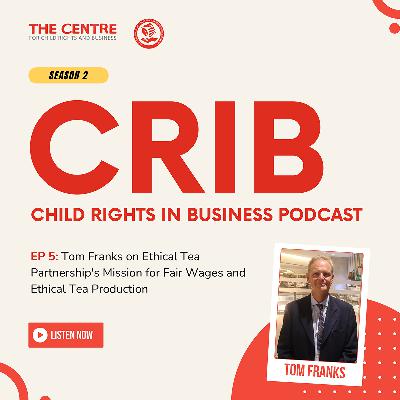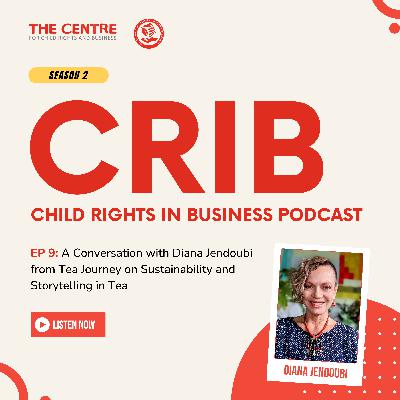Discover The Child Rights in Business Podcast
The Child Rights in Business Podcast

The Child Rights in Business Podcast
Author: The Centre for Child Rights and Business
Subscribed: 1Played: 5Subscribe
Share
© Copyright 2024 All rights reserved.
Description
Welcome to the CRIB Child Rights in Business podcast series, presented by The Centre for Child Rights and Business. As an integral part of the Mother and Child-friendly Seal for Responsible Business Initiative, this podcast aims to actively engage stakeholders within a chosen business sector in meaningful conversations about the critical aspects of women’s and child rights in the world of business. In Seasons 1 & 2, we focused on the Sri Lankan and global tea industry.
14 Episodes
Reverse
Welcome to Child Rights in Business (CRIB) Podcast by The Centre for Child Rights and Business hosted by The Centre's Sri Lanka Country Director, Ahila Thillainathan. In our first ever episode, we discuss the topic of access to quality education for children living in plantation communities.
Our two guests on the podcast are Mr. Muralitharan, Director Plantation Schools Development, Ministry of Education and Mr. Anuruddha Gamage, General Manager HR & Corporate Sustainability, Kelani Valley Plantations.
In episode 2 of the CRIB podcast, guests Lihini Senanayake and Ushan Chaminda Gamage, co-founders of Gavesha Labs, talk about what inspired them to create Gavesha and how important it is for parents and educators to enable children to dream so they can become innovators and be able to explore different pathways in Science. Gavesha Labs is a Sri Lankan based edtech startup with a vision to empower STEM education through technology and reduce barriers for kids in accessing tech education. In 2023, they teamed up with Kelani Valley Plantations and UNICEF to set up weather stations on the estates and to train local youth on collecting and analysing weather data. The initiative was a winner of the Child Rights in Business Challenge by The Centre for Child Rights and Business, which provided funding to kickstart the initiative. This episode was first released on International Day of Women and Girls in Science on February 11, 2023.
The tea industry is one that has been historically dominated by men, particularly in leadership roles. However, as companies strive towards greater diversity and inclusivity, more and more women are breaking through barriers and making their mark in the sector. One such woman is Mrs. Niluza Badurdeen, Director Strategy and Finance of English Tea Shop Organic.
In a recent podcast interview, Niluza shared her journey as a woman leader in the tea industry and the steps her company has taken to create an enabling environment for women to progress in their leadership journeys. Here are some of the key insights that emerged from the conversation:
Equal Opportunities and Pay: Niluza's company established 100% equal pay and equal opportunities for career progression from the very beginning. This has had a significant impact on the number of women in management and leadership positions.
Flexible Work Arrangements: To help women balance their work and home responsibilities, the company offers extended work-from-home arrangements and provides facilities such as transportation to and from work, childcare benefits, and partnerships with childcare centers. This has allowed women to continue pursuing their career ambitions while also fulfilling their family responsibilities.
Career Progression: To enable women to utilise their leadership potential and grow within the company, Niluza's company offers open opportunities for women in any field, including strategy, engineering, marketing, communication, quality, compliance, and more. This has helped to break down traditional gender barriers and provide more opportunities for women to showcase their talents.
Supportive Work Environment: Niluza emphasised the importance of a company that values its human resources and creates a supportive work environment. This not only motivates employees to perform better but also creates a sense of belonging and commitment to the company. In Niluza's case, almost 250 of the company's employees own 30% of the business, which has helped to create a sense of ownership and investment in the company's success.
In conclusion, Niluza's story is a testament to the fact that it is possible to create an enabling environment for women in the workplace. From equal opportunities and pay to flexible work arrangements and a supportive work environment, companies can take concrete steps to empower their female employees and enable them to grow and thrive in their careers. It's a win-win situation for both employees and employers, as diverse teams are known to be more innovative and effective. It is time for more companies in the tea industry and beyond to take a leaf out of English Tea Shop Organic's book and create a more inclusive and empowering workplace for all.
On the International Day of Families, we are highlighting the significance of investing in family-friendly workplaces, and our guest for this episode is Mr. Suranga Herath, CEO of English Tea Shop Organic. He discusses the company's vision, initiatives, and their impact on the business.
English Tea Shop Organic's goal is to improve agriculture in Sri Lanka through organic farming and direct collaboration with small farmers. The company prioritises empowering farmers and enhancing employee ownership, aiming to become a majority employee-owned business. The company follows a "Prajãva" philosophy (which translates to the word “community” in Sinhalese); it is a transformative mindset, where a business evolves from being a mere part of the community to becoming its beating heart and soul. Hence, by prioritising the interests of its community, English Tea Shop Organic can foster stronger and more meaningful relationships, all while creating shared value for everyone involved. They have implemented open book management and are significantly employee-owned.
In line with their principle of prioritising people-centric operations, English Tea Shop has introduced the Prajãva Wellbeing programme, which emphasises the well-being of stakeholders as an integral part of their business. The company places a strong emphasis on establishing family-friendly workplaces, accomplished by implementing a comprehensive health programme, providing training in household economics management, promoting entrepreneurship among employees' spouses, and creating a self-sustaining virtuous cycle of interventions. Their Child Benefit Initiative, a significant collaboration, provides monthly benefits to the children of their employees, having a positive impact on both the recipients and the company. They also provide training and inspiration to spouses on household budgeting and decision-making, aiming to encourage male entrepreneurship and help feed more than one family.
Mr. Herath emphasises the importance of investing in employees' families and suppliers, as relationships go beyond the workplace, and a business's success depends on the well-being of its people. English Tea Shop's business model prioritises people over profits through conscious capitalism. By investing in the families of its staff, employees, and suppliers, the company helps to solve social inequality through a conscious capitalist model.
Empowering societies is crucial to facing climate and nature crises, and the company aims to leave a legacy that proves the world's wealth can be distributed better through business. Mr. Herath plans to be transparent with communities, customers, trade customers, and distributors about the program's benefits and details. Collaborating with customers can amplify the impact on communities, making it a win-win situation for everyone involved.
In summary, Mr. Herath's vision is to create a business that not only provides high-quality organic tea but also makes a positive impact on society. By investing in people, the company helps to create a better world for everyone.
As we conclude the first season of our podcast series, we would like to highlight an impactful initiative that The Centre for Child Rights and Business (The Centre) has been working on in Sri Lanka. In collaboration with strategic partners such as Save the Children (Sri Lanka and Hong Kong) and key stakeholders from the tea industry, we have introduced the Mother and Child-Friendly Seal for Responsible Business. This certification programme assesses the impact of businesses on the lives of their employees and supply chain, particularly in relation to children and their families. In this article, we will recap the SEAL Initiative's objectives and emphasise its significance in promoting and fulfilling children's rights.
Promoting Children's Rights:
While the primary responsibility for promoting, protecting, and ensuring children's rights lies with the government, other stakeholders such as parents, civil society, and businesses also have a role to play. The SEAL Initiative serves as a pathway for businesses to ensure that their operations do not hinder the enjoyment of children's rights throughout their supply chains. By adhering to child rights and business principles and implementing human rights due diligence, businesses can actively contribute to the well-being of children and their families.
Objectives of the SEAL Initiative:
The SEAL Initiative has four primary objectives, each crucial in advancing the cause of children's rights:
Creating a Family-Friendly Supply Chain: The Initiative aims to strengthen businesses' commitment to establishing a supply chain that supports the human rights of children and their families. By encouraging family-friendly practices, businesses can contribute to a nurturing and inclusive work environment.
Promoting Meaningful Investments: Businesses are encouraged to make sustainable investments that positively impact the lives of children and their families. The SEAL Initiative provides a framework for businesses to assess and improve the outcomes of their investments in areas such as education, health, and protection.
Facilitating Collaboration: The Initiative seeks to bridge the gap between the public and private sectors, fostering collaboration to enhance service delivery in crucial areas. By partnering with government entities and civil society organisations, businesses can create a more comprehensive and effective support system for children and their families.
Creating Market Differentiation: Through the Seal Initiative, the Sri Lankan tea industry can demonstrate its commitment to being a family-friendly industry. This commitment can serve as a market differentiator, showcasing the industry's efforts to prioritise the rights and well-being of children throughout its supply chain.
Expanding Impact:
While the current focus of the Seal Initiative is on the tea industry in Sri Lanka, the long-term vision is to expand its reach to other sectors within the country. By incorporating child rights principles and encouraging responsible business practices, the initiative aims to inspire positive change across various industries.
Engage and Participate:
To learn more about the SEAL Initiative, interested parties can visit the "Mother and Child- Friendly Seal for Responsible Business" website. This platform provides comprehensive information about the initiative, including how companies can enroll and engage in the programme. The website also features the "Child Rights in Business Tea Network," a forum where stakeholders from the industry, development agencies, civil society organisations, and government entities can collaborate, exchange ideas, and explore partnerships.
In our first episode of Season 2 of the CRIB Podcast, we hear an insightful conversation with Ines Kaempfer, CEO of The Center for Child Rights in Business, and Shabnam Weber, President of the Tea and Herbal Association of Canada, recorded at the Colombo Tea Convention in July 2024.
The discussion explores wages and prices in the tea industry, the impact of human rights due diligence laws on business models, particularly in Europe, successful initiatives by the Tea and Herbal Association of Canada, including a global campaign called “Tea Power” and an education programme promoting tea knowledge, and the importance of collaborative efforts to address industry challenges and promote sustainable practices.
One of the key challenges faced by the tea industry is fair pricing, which affects everyone along the supply chain, but in particular those in the upstream such as farmers, pickers and smallholders. Fair pricing not only relates to the wages given to workers, but also to the value and price of tea on the markets.
"The biggest issue within this industry, and we've heard this quite a bit is tea is too cheap...Consumers do not pay enough for their product. Our product is used as a loss leader by supermarkets. And that has to stop. And I really believe that we as an industry need to take control back into our hands. And, you know, we've talked about things like increasing the quality of the product, in order to increase the value, not to be chasing just yield and quantity, right? Because that is going to drive down the price of tea. But more than anything, I think that we need to stop, truly refuse, to sell tea below the cost of production, because that's what's happening right now. There is no other product, nothing that you can name me, that would sell to a consumer for less than what it costs to make it." Shabnam Weber, President of the Tea and Herbal Association of Canada.
Tune in to hear the full conversation.
In Season 2, Episode 2 of the CRIB Child Rights in Business podcast, The Centre's CEO Ines Kaempfer sits down with Sharon Hall, Chief Executive of the UK Tea & Infusions Association.
Their conversation leads us through the history and work of the UK Tea & Infusions Association, and some of the implications of the evolving human rights due diligence regulatory landscape, both in post-Brexit UK and in the EU. They discuss what these changes might mean for the tea value chain and for consumers, as well as other insights.
About the CRIB Child Rights in Business podcast
This podcast is dedicated to discussing sustainability in the tea industry, particularly issues around human rights and ensuring no one in the tea supply chain is left behind from the value tea creates. In Season 1, we spoke to key voices from Sri Lanka's tea sector, and highlighted initiatives that are creating tangible, long-term impact for local communities. In Season 2, our conversations go global, speaking with experts from across the world on the bigger picture of tea sustainability amidst the emergence of human rights due diligence legislation that will impact brands, retailers and also business partners along the supply chain, including producers.
Please support us by following our podcast. More information about our work can be found at www.childrights-business.org.
In Episode 3 of Season 2 of the CRIB - Child Rights in Business podcast, The Centre's CEO Ines Kaempfer sits down with Madhuri Nanda, Director of South Asia at Rainforest Alliance for a conversation about Rainforest Alliance's work in the tea sector and some of the lesser known landscape level work they do to promote sustainable agriculture, human rights issues and gender inequality, beyond their well-established certification programme.
Listen to learn about Rainforest Alliance's work in sustainable agriculture, with a focus on the tea industry in Sri Lanka and India, a new pilot programme with The Centre that aims to create gender champions in tea estates and more. Madhuri highlights the shift from a pass/fail certification approach to an "assess and address" method, which encourages tea producers to actively identify and tackle social issues like gender inequality, human rights concerns, and livelihoods. She also stresses the importance of shared responsibility between producers and buyers to drive sustainability and discusses how we can move beyond sustainable agriculture toward regenerative agriculture to restore soil health, biodiversity, and improve livelihoods in the tea sector.
Tune in for this and more!
For more information about The Centre's work in the tea industry, please visit www.srilanka-motherandchildseal.org
In Episode 4 of the CRIB Child Rights in Business Podcast, The Centre’s Sri Lanka Country Director Ahila Thillainathan sat down with Elyse Petersen, founder of Tealet, an innovative B2B marketplace that is on a mission to transform the tea industry.
Elyse details how Tealet facilitates direct trade between independent, family-owned tea farms and business buyers, with an emphasis on transparency and high-quality tea. She explains Tealet’s innovative approach, including its decentralised organisation model and open enrollment system for suppliers, which ensures transparency and fair transactions.
Elyse also highlights her mission to give tea producers a platform to be heard, advocating for their rights and amplifying their voices in the market. She discusses the significant value and quality differences in tea and how Tealet supports small producers in achieving premium pricing for their high-calibre teas.
With growing consumer demand for ethical products, Elyse shares her vision of creating a more transparent and equitable market that values both tea quality and producer empowerment. Make sure to tune in!
In the latest episode of the CRIB Child Rights in Business podcast, we sit down with Tom Franks, Chair of the Ethical Tea Partnership (ETP), to explore the critical issues facing the global tea industry today. ETP is a global organisation focused on catalysing systemic change in the tea sector, with a particular emphasis on improving the lives of workers at the origin of tea production.
During this conversation, hosted by The Centre for Child Rights and Business’ CEO, Ines Kaempfer, Tom discusses the complexities around achieving living wages for tea workers, gender equality, and responsible sourcing. He also delves into how ETP is aligning its practices with new human rights due diligence guidelines like the OECD and UN Principles while addressing the practical challenges faced by both large and small-scale tea packers.
One of the episode’s highlights is Tom’s insight into the balance between pushing for systemic change and making tangible, on-the-ground impacts. He shares stories of how even small-scale initiatives can make a real difference in the lives of tea workers, bringing the industry closer to fairer wages and better working conditions.
Join us for an eye-opening episode that looks at the challenges and opportunities in the tea sector and the role ETP plays in promoting ethical business practices. Whether you are interested in sustainability, human rights, or the tea industry itself, this episode offers valuable insights into the path toward more responsible sourcing and fair treatment for tea workers around the world.
Listen now on your favourite podcast platform, and be sure to check out more about the Ethical Tea Partnership at www.etp-global.org and The Centre’s work at www.childrights-business.org.
In Episode 6 of the CRIB Child Rights in Business podcast, we discuss challenges related to poverty among tea workers in the global tea industry with Sabita Banerji, CEO and Founder of THIRST, interviewed by Ahila Thillainathan, Sri Lanka Country Director for The Centre for Child Rights and Business.
Despite tea being the world’s second most popular drink after water, the workers who produce it often live in poverty. Sabita sheds light on why this is the case, explaining how the denial of poverty within the tea sector keeps workers from achieving acceptable living standards and the role THIRST plays in raising awareness of this. As young people leave the industry in search of better opportunities, Sabita highlights the importance of acknowledging the problem and taking collective responsibility to address it.
This episode also explores how consumers can play a role in creating change. Sabita argues that it’s not just about paying more for tea, but about understanding its true value—both in terms of quality and ethics.
The conversation also covers creative solutions to achieving living wages for tea workers, gender equity, what the future of the tea industry could look like and more.
In Episode 7, we bring you a conversation recorded live at this year’s Colombo Tea Convention. Our CEO, Ines Kaempfer, sits down with Dr. Ebrahim Afshar, Managing Director of Ahmad Tea, to discuss a critical issue: ensuring fair wages for tea workers.
They explore how Ahmad Tea is challenging the status quo, pushing for tea prices that truly benefit the farmers, and encouraging consumers to support products that meet living wage criteria. Dr. Afshar also introduces a new initiative focused on making direct digital payments to tea pluckers—an important step towards paying fair wages.
In this episode, our Sri Lanka Country Director Ahila Thillainathan sits down with Simon Bell, co-founder and Managing Director of AMBA Estate, a social enterprise that is reshaping the Sri Lankan tea industry through sustainable practices and local community empowerment.
Simon shares how AMBA Estate’s unique approach—focusing on fair wages, local hiring, and creating opportunities for skill development—has made it a model of responsible business in Sri Lanka. He discusses the challenges of the traditional tea industry and how AMBA’s people-centric practices are attracting a new generation to work in tea. From revenue-sharing models to career advancement for workers, Simon offers insights into creating a thriving business that benefits both employees and the broader community.
More on Amba Estate: www.ambaestate.com
More on The Centre for Child Rights and Business: www.childrights-business.org
More on The Mother and Child-Friendly Seal for Responsible Business: www.srilanka-motherandchildseal.org
Contact us: info.SL@childrights-business.org
In the final episode of Season 2 of the CRIB Podcast, we sit down with Diana Jendoubi, a writer for Tea Journey. Diana shares her insights on Sri Lanka’s tea industry, what drives sustainability, and the role of consumers in supporting tea communities. Plus, we learn more about Tea Journey, a digital magazine bringing global stories from the tea world in over a dozen languages.
Learn more about Tea Journey here: https://teajourney.pub/
All episodes of the CRIB Podcast Season 2 can be found here: https://www.childrights-business.org/resources/listen-to-season-2-of-the-crib-child-rights-in-business-podcast
All episodes of the CRIB Podcast Season 1 can be found here: https://www.srilanka-motherandchildseal.org/Home/Podcast
Thanks for supporting this podcast! Look out for a new season in 2025!














